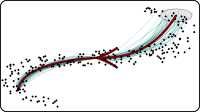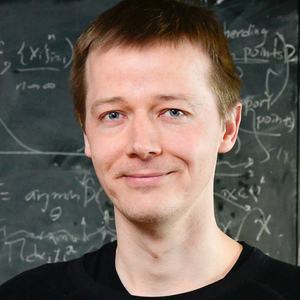Probabilistic Solutions to Differential Equations and their Application to Riemannian Statistics

We study a probabilistic numerical method for the solution of both boundary and initial value problems that returns a joint Gaussian process posterior over the solution. Such methods have concrete value in the statistics on Riemannian manifolds, where non-analytic ordinary differential equations are involved in virtually all computations. The probabilistic formulation permits marginalising the uncertainty of the numerical solution such that statistics are less sensitive to inaccuracies. This leads to new Riemannian algorithms for mean value computations and principal geodesic analysis. Marginalisation also means results can be less precise than point estimates, enabling a noticeable speed-up over the state of the art. Our approach is an argument for a wider point that uncertainty caused by numerical calculations should be tracked throughout the pipeline of machine learning algorithms.
| Author(s): | Philipp Hennig and Soren Hauberg |
| Book Title: | Proceedings of the 17th International Conference on Artificial Intelligence and Statistics |
| Volume: | 33 |
| Pages: | 347-355 |
| Year: | 2014 |
| Month: | April |
| Series: | JMLR: Workshop and Conference Proceedings |
| Editors: | S Kaski and J Corander |
| Publisher: | Microtome Publishing |
| Bibtex Type: | Conference Paper (inproceedings) |
| Address: | Brookline, MA |
| Event Name: | AISTATS 2014 |
| Event Place: | Reykjavik, Iceland |
| Electronic Archiving: | grant_archive |
| Links: | |
BibTex
@inproceedings{hennig:aistats:2014,
title = {Probabilistic Solutions to Differential Equations and their Application to Riemannian Statistics},
booktitle = {Proceedings of the 17th International Conference on Artificial Intelligence and Statistics},
abstract = {We study a probabilistic numerical method for the solution of both
boundary and initial value problems that returns a joint Gaussian
process posterior over the solution. Such methods have concrete value
in the statistics on Riemannian manifolds, where non-analytic ordinary
differential equations are involved in virtually all computations. The
probabilistic formulation permits marginalising the uncertainty of the
numerical solution such that statistics are less sensitive to
inaccuracies. This leads to new Riemannian algorithms for mean value
computations and principal geodesic analysis. Marginalisation also
means results can be less precise than point estimates, enabling a
noticeable speed-up over the state of the art. Our approach is an
argument for a wider point that uncertainty caused by numerical
calculations should be tracked throughout the pipeline of machine
learning algorithms.},
volume = {33},
pages = {347-355},
series = {JMLR: Workshop and Conference Proceedings},
editors = { S Kaski and J Corander},
publisher = {Microtome Publishing},
address = {Brookline, MA},
month = apr,
year = {2014},
slug = {hennig-aistats-2014},
author = {Hennig, Philipp and Hauberg, S{o}ren},
month_numeric = {4}
}

